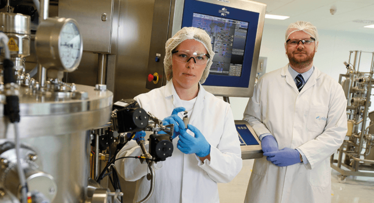Smart Sensor Capsule
A capsule being developed in Ireland aims to contain not medicine, but process analytical technology

What’s the story behind this collaboration?
The NIBRT-Tyndall collaboration arose from an initial interaction between the Institutes at the National Innovation Showcase event, which was held in Dublin in December 2014. Following a series of conversations, the concept of the process analytical technology capsule – the ‘PATsule’ – was born. It’s a very exciting project that blends Tyndall’s expertise in sensing devices and microelectronics with NIBRT’s excellence in biopharmaceutical manufacture. The collaboration will be coordinated from Tyndall by us, and will employ research assistants and postdoctoral researchers across both institutions, funded by Enterprise Ireland through their Commercialisation Fund program.
Where does the PATsule fit into the process?
Producing biopharmaceuticals is a very complex procedure, and the production process requires constant and detailed monitoring to ensure the expression of the correct form of the therapeutic protein within bioreactors with the correct critical quality attributes. This is where the PATsule comes in. Current process monitoring is performed using fixed sensor probes. The PATsule, a mobile sensing device, can move freely within the bioreactor, continuously monitoring and analyzing the production vessel environment in both time and space. This information will help biopharmaceutical manufacturers to visualise and control their process, making it uniform. PATsule involves a multi-disciplinary approach of micro- and nano-sensor technology, miniaturized instrumentation, data analytics and wireless communications. The capsule will incorporate autonomous sensing technology that probes the bioreactor environment, gathering multiparametric data on pH, temperature and dissolved oxygen, and then transmitting that information wirelessly to an external system control and data analysis (SCADA) computer.
What are the main challenges?
Developing a capsule technology like this required us to address several challenges. One of the initial issues was the design of the sensor chip. The sensors within the capsule must be sensitive enough to reliably detect the parameters of interest. To achieve this, we are exploring and incorporating some of the latest advances in micro- and nano-technology. Additionally, we need to incorporate a number of sensor methodologies on the same chip. To address this, we are applying advanced ICT developments to provide a chip that is low cost and that can be integrated easily within the capsule.
What stage is the sensor chip at?
The sensor chip is being developed by a multi-disciplinary team of scientists and engineers. This chip will directly access the bioreactor environment so must be robust enough to withstand bioreactor conditions, for example the presence of media and cells and fluid dynamics induced by the action of the impellors etc., and operate in an accurate and precise manner for the operational lifetime of the capsule. The next steps are to start work on the associated instrumentation to control the sensor chip.
What are your hopes for the future of the technology?
The PATsule forms a key part of the ‘Industrial Internet of Things’ concept being investigated by Tyndall and NIBRT to support new developments in bioprocessing. PATsule offers significant advantages and potential for increased process control due to the mobile nature of the device. Together, we’re already considering PATsule 2.0 and PATsule 3.0 that will build on the device being developed in the current collaboration, wherein additional features and increased multiparametric sensing of critical process parameters are being considered to increase the added value of the device. We’re looking at technology advancements in the area of medical devices too, particularly with regard to battery lifetimes to enable PATsule-based monitoring in high-intensity, long-duration continuous bioprocesses. We’re also engaging with business systems analysts, informaticians and software developers to generate compliant software apps and knowledge extraction algorithms.

Making great scientific magazines isn’t just about delivering knowledge and high quality content; it’s also about packaging these in the right words to ensure that someone is truly inspired by a topic. My passion is ensuring that our authors’ expertise is presented as a seamless and enjoyable reading experience, whether in print, in digital or on social media. I’ve spent fourteen years writing and editing features for scientific and manufacturing publications, and in making this content engaging and accessible without sacrificing its scientific integrity. There is nothing better than a magazine with great content that feels great to read.



















